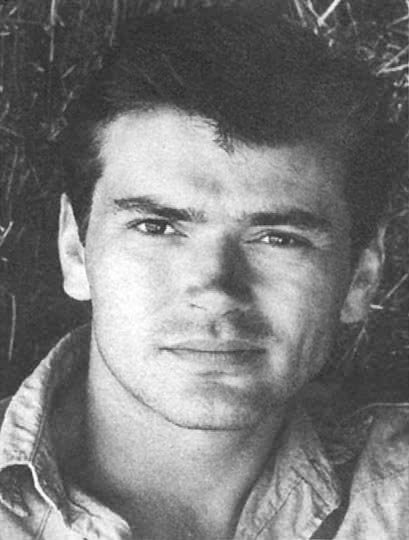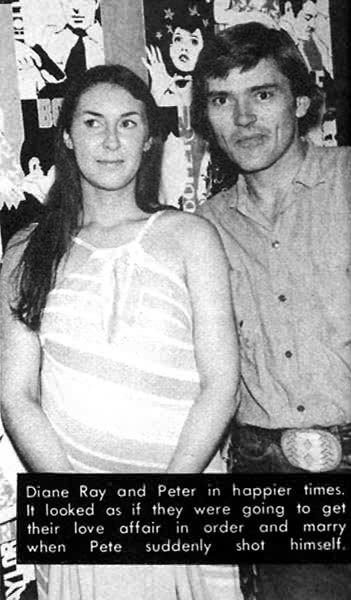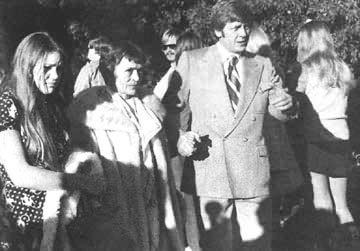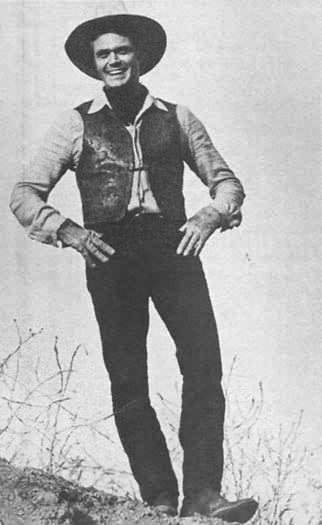- HOLLYWOOD WHISPERS
- by Paulette Lee
- Movie Life, April 1972
Excerpt from Editor's
Column of this same issue: ...it's
very difficult to talk about the sadness Hollywood felt over
Peter Duel's suicide. Our colunmist, Paulette Lee, is one of
the few competent to explore the whys and wherefores of Pete's
final action for, over the years, she had interviewed him frequently
and had come to be regarded as a friend.
 The first question that came to mind as Hollywood
and his fans reeled from the shock of the death of Peter Duel
was WHY? Why would any young man of 31, a popular TV actor, engaged
to be married and, in every way, seemingly sitting on top of
the world, take his own life? It seemed unreal, incredible, far
less believable than the scripts of Alias Smith and Jones,
the ABC-TV series in which he co-starred with Ben Murphy.
The show is fiction. Pete's sad, final act of desperation was
real life.
The first question that came to mind as Hollywood
and his fans reeled from the shock of the death of Peter Duel
was WHY? Why would any young man of 31, a popular TV actor, engaged
to be married and, in every way, seemingly sitting on top of
the world, take his own life? It seemed unreal, incredible, far
less believable than the scripts of Alias Smith and Jones,
the ABC-TV series in which he co-starred with Ben Murphy.
The show is fiction. Pete's sad, final act of desperation was
real life.
On the surface Pete appeared happy, satisfied
with life, a man content and adjusted to the world around him.
But those few people who penetrated beyond that satisfied, smiling
veneer that Pete wore knew that what he presented on the outside
was not at all what he felt within.
The cold facts, as they were presented
after Peter's death - which took place around 1.25 am on December
31st, the last day of 1971 - could not be expected to even begin
to explain the confusion this man had experienced. But here the
facts are, as well as anyone can piece them together.
Since arriving home from Universal Studios,
where he filmed his show, Peter had been doing the one thing he
knew was absolutely wrong for him - drinking heavily. Later that
evening he watched an episode of Alias Smith and Jones
in his Beechwood Village home with Diane Ray, whom he was
planning to marry. After the show he switched channels so he could
watch the Los Angeles Lakers-Seattle Supersonics Basketball game.
Diane, who is not as enthusiastic about sports as Peter was, went
to bed in an adjoining room before the game was over. A few hours
later Diane said she was awakened when Peter entered the bedroom,
and took a .38 caliber revolver from a box. Then he walked away
saying, ‘I'll see you later.' Within minutes, she heard what
sounded like gunfire coming from the living room and went in to
investigate. She found Peter's body lying underneath his brightly
ornamented Christmas tree.
When the police came, they found the gun
at Peter's feet. Investigators said that the way the gun was found,
the position of the body and the angle of the head wound led them
to conclude it was suicide. The bullet that killed Peter entered
the right side and exited the left side, police said. There was
a half-dollar size hole in the front window of the home and it
is believed the bullet passed out that way. At 9.45 am, Det. Sgt.
John Edwards found a bullet lying in a car port directly across
from Duel's house.
Miss Ray, who was naturally in a state
of shock, was questioned extensively by the police when they first
arrived on the scene, and she accompanied them to the Hollywood
police station. Detectives revealed that there was initial confusion
about the tragedy, due to the fact that it appeared two shots
had been fired from the gun. However, further investigation revealed
that Peter apparently had released a bullet from the same gun
a few days earlier. His aim had been at a wall on which hung a
notice informing him he had not been elected to the board of the
Screen Actor's Guild.
That last bit of information reveals a
lot about the inner turmoil of Peter Duel. that is not to say
he felt overly upset about the fact that he had lost on the Screen
Actors Guild election. It went much deeper than that. The bullet
aimed at the piece of paper must have been shot out of frustration
and unhappiness - two emotions he had come to equate with his
Hollywood stardom.
In as few words as possible, Peter had
never been able to satisfy himself in the plastic world of filmland.
Friends felt he had trouble adjusting to the hypocrisy that is
gradually destroying the industry. Ironically, even after his
death, that very "hypocrisy" continued. People with
whom he had worked at Universal stated that Peter had been very
cheerful and put in a full day of work before going home and taking
his own life. They added that the young star had been in good
spirits for weeks and "certainly he was not unhappy with
anything in his professional life."
Perhaps "hypocrisy" is the wrong
word. Perhaps these people truly believed what they said. If so,
then one must feel an even heavier sadness for Peter, and for
the many other people like him. For Peter was able to easily fool
those around him who saw only what he projected or, perhaps, only
what they wanted to see. They never bothered to look into the
agonized soul of the man himself.
In his early years, Peter, a native of
Rochester, New York, was planning on a career in medicine, following
the footsteps of his father, his grandfather and great-grandfather.
His mother was a nurse. But while Peter was attending St. Lawrence
University in Canton, New York, his parents saw him in a play.
They told him he should not feel "obligated" to become
a doctor unless he truly felt that was his calling.
Armed with this encouragement, Peter enrolled
in the American Theater Wing in New York, went on to work in repertory
companies, then to the road show company of the Broadway hit,
Take Her, She's Mine starring Tom Ewell. Pete then
moved on to Hollywood and small parts. His first Hollywood break
was the part of the misguided brother-in-law in Gidget.
From there he went into Love On A Rooftop, co-starring
with Judy Carne. When that show was cancelled, he appeared in
many other TV shows, including The Virginian, Ironside
and Marcus Welby, M.D.
In a segment of the latter, he played
a young American Indian doctor, tom between modem medicine and
his Indian philosophy. It was one of his favorite roles because,
as he revealed to this writer, "I feel very much like that,
myself. Torn. I've had a middle-class moralistic upbringing, yet
today's ways are so different. I want to be free and let myself
go, but the guilt feelings creep in."
Peter never married, though he had several
close brushes with matrimony. He kept putting it off until, as
he recently said, "I can get it all together for myself.
How can I take on the responsibility of a family, until I know
where I'm at?" He dated Sally Field, star of Gidget,
for a long time. Then he became involved with actress-model Jill
Andre, a divorcee with two children.
One of the women he related to best was
his Love On A Rooftop co-star, Judy Carne. But they were never
a romance. Pete introduced Judy (who had just divorced Burt
Reynolds at the time) to the joys of motorcycling. They'd
both jump on their cycles after work and ride into the hills.
But it was never a romance. "We dig each other," said
Judy at the time. "Pete's been good for me. He's taught me
to leap into life and live every moment to the limit."
Maybe this philosophy helped lead Peter
to his untimely end. He was always getting involved and his home
was always open to young struggling actors, he became more and
more involved in the problems of others and the world. His head
never grew one bit larger with success, but his heart did. He
was a concerned young man, and it bothered him that he couldn't
actually do much to change or better the world.
 So Peter
turned to drink. Last June 15 he had his second drunk driving
conviction in four years. The first came after being arrested
in 1966 for being drunk. The second conviction stemmed from an
October 1970 incident for which he was booked by the California
State Highway Patrol. Troopers said they had picked him up walking
glassy-eyed away from a crash that injured two people. Peter flunked
their on-the-spot sobriety test. When the case came up on June
15 1971, Judge Bernard B. Seiber granted Pete probation
due to a letter the actor had written the court. In part it said,
'In recalling my feelings on that night, shame and terror literally
filled my mind. Sitting here eight months later, it is very difficult
to recreate the events of the accident, or even try to find justification
for my actions, but I do want your Honor to know that I am a person
basically interested in other people and I would not knowingly
do harm to anyone.'
So Peter
turned to drink. Last June 15 he had his second drunk driving
conviction in four years. The first came after being arrested
in 1966 for being drunk. The second conviction stemmed from an
October 1970 incident for which he was booked by the California
State Highway Patrol. Troopers said they had picked him up walking
glassy-eyed away from a crash that injured two people. Peter flunked
their on-the-spot sobriety test. When the case came up on June
15 1971, Judge Bernard B. Seiber granted Pete probation
due to a letter the actor had written the court. In part it said,
'In recalling my feelings on that night, shame and terror literally
filled my mind. Sitting here eight months later, it is very difficult
to recreate the events of the accident, or even try to find justification
for my actions, but I do want your Honor to know that I am a person
basically interested in other people and I would not knowingly
do harm to anyone.'
Peter's letter went on to explain that
he had sought psychiatric help and also was going to Alcoholics
Anonymous. He added 'I am not drinking any more. I am trying to
find out the cause for my drinking.., and I feel that I can prove
to your Honor that I will not be involved any further with the
law, particularly with regard to drinking and driving.'
But try as he did - and he did
try, Peter could not lick the drinking problem. He did attend
A.A. meetings. He did make pledges - and he meant them. But then
he'd get so uptight that a drink seemed to be the only answer.
He began to try and live the A.A. philosophy, "It's A Day
At A Time," meaning you take each day and do your best, without
guilt for yesterday or worry for tomorrow. Somehow it just didn't
work for Peter. The night of his death found him drinking again.
Peter once told this writer, "I think
that everyone is an institution and everyone with deep problems
believes that if they really look at their problems, and analyze
them, they will die. It is a fear I live with all the time."
Perhaps that is what eventually happened
to the handsome, warm-hearted, loveable Peter. Did he scrutinize
too hard and decide he could not face another year because he
had not yet "gotten it all together?" None of us will
probably ever know. But this writer cannot help but be touched
by a long piece of prose Peter once gave us. It is too lengthy
for these pages, but it begins thusly: "Don't be fooled by
me. Don't be fooled by the face I wear. For I wear a mask. I wear
a thousand masks, masks that I'm afraid to take off, and none
of them are the real me. Pretending is an art that's second
nature to me, but don't be fooled. FOR GOD'S SAKE, DON'T BE FOOLED.
"I give you the impression that I'm
secure, that all is sunny and unruffled with me, within as well
as without, that confidence is my name, and coolness my game,
that the water's calm, and I'm in command. I need no one. But
Don't Believe Me, PLEASE. Don't."
Looking back, it's easy to see that Peter
wasn't just trying to be dramatic--he was making a genuine plea
for help. Peter wasn't secure and he wasn't confident. He couldn't
lick his drinking problem, and no one ever really got deep enough
into his soul to help him.
Because of this a beautiful young man
has been lost to us all.
 Photo Caption: (From left)
Pamela Duel, Peter's mother, and a family friend attended Peter's
funeral.
Photo Caption: (From left)
Pamela Duel, Peter's mother, and a family friend attended Peter's
funeral.
 Photo
Caption: Pete met Kim Darby when they co-starred in Generation.
They dated steadily and some say Pete never got over his love
for the wide-eyed, popular actress.
Photo
Caption: Pete met Kim Darby when they co-starred in Generation.
They dated steadily and some say Pete never got over his love
for the wide-eyed, popular actress.
 Photo
Caption: In the usual, "the show must go on" tradition,
ABC-TV wasted little time in signing Roger Davis to replace Peter
in Alias Smith and Jones. Roger starred for several years
on daytime TV in Dark Shadows and has been in several movies.
Likeable Peter Duel will be a tough act to follow. The future
success of the show will depend upon the fans' acceptance of Ben
Murphy's new partner.
Photo
Caption: In the usual, "the show must go on" tradition,
ABC-TV wasted little time in signing Roger Davis to replace Peter
in Alias Smith and Jones. Roger starred for several years
on daytime TV in Dark Shadows and has been in several movies.
Likeable Peter Duel will be a tough act to follow. The future
success of the show will depend upon the fans' acceptance of Ben
Murphy's new partner.
Back to Articles List
 The first question that came to mind as Hollywood
and his fans reeled from the shock of the death of Peter Duel
was WHY? Why would any young man of 31, a popular TV actor, engaged
to be married and, in every way, seemingly sitting on top of
the world, take his own life? It seemed unreal, incredible, far
less believable than the scripts of Alias Smith and Jones,
the ABC-TV series in which he co-starred with Ben Murphy.
The show is fiction. Pete's sad, final act of desperation was
real life.
The first question that came to mind as Hollywood
and his fans reeled from the shock of the death of Peter Duel
was WHY? Why would any young man of 31, a popular TV actor, engaged
to be married and, in every way, seemingly sitting on top of
the world, take his own life? It seemed unreal, incredible, far
less believable than the scripts of Alias Smith and Jones,
the ABC-TV series in which he co-starred with Ben Murphy.
The show is fiction. Pete's sad, final act of desperation was
real life.
 So Peter
turned to drink. Last June 15 he had his second drunk driving
conviction in four years. The first came after being arrested
in 1966 for being drunk. The second conviction stemmed from an
October 1970 incident for which he was booked by the California
State Highway Patrol. Troopers said they had picked him up walking
glassy-eyed away from a crash that injured two people. Peter flunked
their on-the-spot sobriety test. When the case came up on June
15 1971, Judge Bernard B. Seiber granted Pete probation
due to a letter the actor had written the court. In part it said,
'In recalling my feelings on that night, shame and terror literally
filled my mind. Sitting here eight months later, it is very difficult
to recreate the events of the accident, or even try to find justification
for my actions, but I do want your Honor to know that I am a person
basically interested in other people and I would not knowingly
do harm to anyone.'
So Peter
turned to drink. Last June 15 he had his second drunk driving
conviction in four years. The first came after being arrested
in 1966 for being drunk. The second conviction stemmed from an
October 1970 incident for which he was booked by the California
State Highway Patrol. Troopers said they had picked him up walking
glassy-eyed away from a crash that injured two people. Peter flunked
their on-the-spot sobriety test. When the case came up on June
15 1971, Judge Bernard B. Seiber granted Pete probation
due to a letter the actor had written the court. In part it said,
'In recalling my feelings on that night, shame and terror literally
filled my mind. Sitting here eight months later, it is very difficult
to recreate the events of the accident, or even try to find justification
for my actions, but I do want your Honor to know that I am a person
basically interested in other people and I would not knowingly
do harm to anyone.' Photo Caption: (From left)
Pamela Duel, Peter's mother, and a family friend attended Peter's
funeral.
Photo Caption: (From left)
Pamela Duel, Peter's mother, and a family friend attended Peter's
funeral. Photo
Caption: Pete met Kim Darby when they co-starred in Generation.
They dated steadily and some say Pete never got over his love
for the wide-eyed, popular actress.
Photo
Caption: Pete met Kim Darby when they co-starred in Generation.
They dated steadily and some say Pete never got over his love
for the wide-eyed, popular actress. Photo
Caption: In the usual, "the show must go on" tradition,
ABC-TV wasted little time in signing Roger Davis to replace Peter
in Alias Smith and Jones. Roger starred for several years
on daytime TV in Dark Shadows and has been in several movies.
Likeable Peter Duel will be a tough act to follow. The future
success of the show will depend upon the fans' acceptance of Ben
Murphy's new partner.
Photo
Caption: In the usual, "the show must go on" tradition,
ABC-TV wasted little time in signing Roger Davis to replace Peter
in Alias Smith and Jones. Roger starred for several years
on daytime TV in Dark Shadows and has been in several movies.
Likeable Peter Duel will be a tough act to follow. The future
success of the show will depend upon the fans' acceptance of Ben
Murphy's new partner.